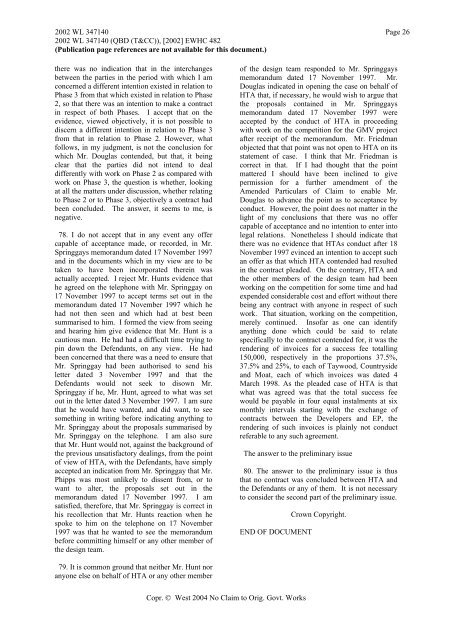Tesco v Constain - Thomson Reuters
Tesco v Constain - Thomson Reuters
Tesco v Constain - Thomson Reuters
Create successful ePaper yourself
Turn your PDF publications into a flip-book with our unique Google optimized e-Paper software.
2002 WL 347140 Page 262002 WL 347140 (QBD (T&CC)), [2002] EWHC 482(Publication page references are not available for this document.)there was no indication that in the interchangesbetween the parties in the period with which I amconcerned a different intention existed in relation toPhase 3 from that which existed in relation to Phase2, so that there was an intention to make a contractin respect of both Phases. I accept that on theevidence, viewed objectively, it is not possible todiscern a different intention in relation to Phase 3from that in relation to Phase 2. However, whatfollows, in my judgment, is not the conclusion forwhich Mr. Douglas contended, but that, it beingclear that the parties did not intend to dealdifferently with work on Phase 2 as compared withwork on Phase 3, the question is whether, lookingat all the matters under discussion, whether relatingto Phase 2 or to Phase 3, objectively a contract hadbeen concluded. The answer, it seems to me, isnegative.78. I do not accept that in any event any offercapable of acceptance made, or recorded, in Mr.Springgays memorandum dated 17 November 1997and in the documents which in my view are to betaken to have been incorporated therein wasactually accepted. I reject Mr. Hunts evidence thathe agreed on the telephone with Mr. Springgay on17 November 1997 to accept terms set out in thememorandum dated 17 November 1997 which hehad not then seen and which had at best beensummarised to him. I formed the view from seeingand hearing him give evidence that Mr. Hunt is acautious man. He had had a difficult time trying topin down the Defendants, on any view. He hadbeen concerned that there was a need to ensure thatMr. Springgay had been authorised to send hisletter dated 3 November 1997 and that theDefendants would not seek to disown Mr.Springgay if he, Mr. Hunt, agreed to what was setout in the letter dated 3 November 1997. I am surethat he would have wanted, and did want, to seesomething in writing before indicating anything toMr. Springgay about the proposals summarised byMr. Springgay on the telephone. I am also surethat Mr. Hunt would not, against the background ofthe previous unsatisfactory dealings, from the pointof view of HTA, with the Defendants, have simplyaccepted an indication from Mr. Springgay that Mr.Phipps was most unlikely to dissent from, or towant to alter, the proposals set out in thememorandum dated 17 November 1997. I amsatisfied, therefore, that Mr. Springgay is correct inhis recollection that Mr. Hunts reaction when hespoke to him on the telephone on 17 November1997 was that he wanted to see the memorandumbefore committing himself or any other member ofthe design team.of the design team responded to Mr. Springgaysmemorandum dated 17 November 1997. Mr.Douglas indicated in opening the case on behalf ofHTA that, if necessary, he would wish to argue thatthe proposals contained in Mr. Springgaysmemorandum dated 17 November 1997 wereaccepted by the conduct of HTA in proceedingwith work on the competition for the GMV projectafter receipt of the memorandum. Mr. Friedmanobjected that that point was not open to HTA on itsstatement of case. I think that Mr. Friedman iscorrect in that. If I had thought that the pointmattered I should have been inclined to givepermission for a further amendment of theAmended Particulars of Claim to enable Mr.Douglas to advance the point as to acceptance byconduct. However, the point does not matter in thelight of my conclusions that there was no offercapable of acceptance and no intention to enter intolegal relations. Nonetheless I should indicate thatthere was no evidence that HTAs conduct after 18November 1997 evinced an intention to accept suchan offer as that which HTA contended had resultedin the contract pleaded. On the contrary, HTA andthe other members of the design team had beenworking on the competition for some time and hadexpended considerable cost and effort without therebeing any contract with anyone in respect of suchwork. That situation, working on the competition,merely continued. Insofar as one can identifyanything done which could be said to relatespecifically to the contract contended for, it was therendering of invoices for a success fee totalling150,000, respectively in the proportions 37.5%,37.5% and 25%, to each of Taywood, Countrysideand Moat, each of which invoices was dated 4March 1998. As the pleaded case of HTA is thatwhat was agreed was that the total success feewould be payable in four equal instalments at sixmonthly intervals starting with the exchange ofcontracts between the Developers and EP, therendering of such invoices is plainly not conductreferable to any such agreement.The answer to the preliminary issue80. The answer to the preliminary issue is thusthat no contract was concluded between HTA andthe Defendants or any of them. It is not necessaryto consider the second part of the preliminary issue.END OF DOCUMENTCrown Copyright.79. It is common ground that neither Mr. Hunt noranyone else on behalf of HTA or any other memberCopr. © West 2004 No Claim to Orig. Govt. Works
















